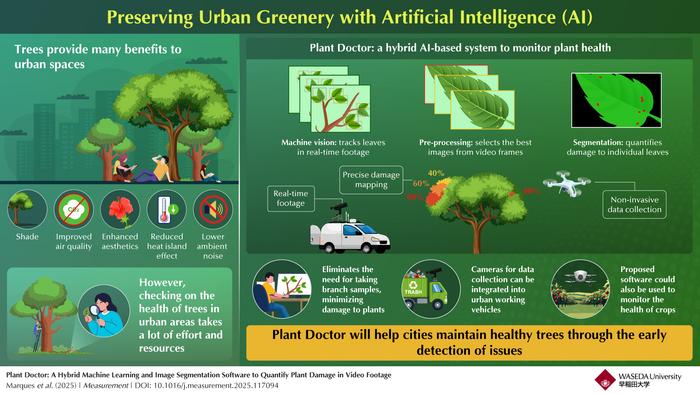A groundbreaking system has emerged in the realm of urban plant health monitoring, leveraging the interplay between artificial intelligence and machine vision—an initiative aptly named "Plant Doctor." Developed by a collaborative research team spearheaded by Professor Shinjiro Umezu’s Laboratory at Waseda University and Professor Kuri Thomas Shiojiri’s Laboratory at Ryukoku University, this innovative approach aims to revolutionize the way we assess the vitality of urban flora. With an increasing number of cities exacerbating the pressures on their green spaces, the need for precise and efficient plant health monitoring has never been more critical.
As urban populations swell, the role of trees and plants transcends mere aesthetic appeal; they play an indispensable role in improving air quality, providing shade, and enhancing property values. However, urban greenery is under siege from a plethora of threats, including pests, diseases, and the looming impact of climate change. In this context, ensuring the health of our urban canopies becomes imperative not just for environmental reasons, but for the overall quality of urban life. This is where the ingenuity of the Plant Doctor system comes into play, aspiring to alleviate the burdens traditionally associated with plant health diagnostics.
Historically, monitoring the health of urban plants has been a labor-intensive process, often requiring the expertise of botanists and extensive fieldwork. This has proved to be increasingly challenging as cities grow larger and more complex, necessitating a more adaptable solution. The Plant Doctor initiative effectively addresses these challenges through the integration of sophisticated AI technologies, effectively merging scientific inquiry with practical application.
The technological underpinnings of the Plant Doctor system involve the seamless integration of three advanced machine vision algorithms: YOLOv8, DeepSORT, and DeepLabV3Plus. Initially, YOLOv8 and DeepSORT work in tandem to identify and track individual leaves across video frames. This ensures that only the most informative images of each leaf are selected for further analysis, effectively streamlining the data collection process. Subsequently, the DeepLabV3Plus algorithm comes into play, engaging in detailed image segmentation to quantify leaf damage with remarkable precision.
The implications of this technology extend beyond the realm of urban forestry. Utilizing cameras typically mounted on drones or vehicles such as garbage trucks maximizes efficiency, allowing routine activities to double as data-gathering operations. This innovative approach minimizes the stress on plant life, as it relies on image capture rather than invasive sampling techniques. The research team validated the effectiveness of the Plant Doctor system through extensive field tests in urban settings, specifically in Tokyo, highlighting its impressive accuracy in diagnosing leaf health issues.
One of the most appealing attributes of this AI-driven solution is its scalability. The Plant Doctor promises not only to supercharge urban greenery monitoring but also to have significant applicability in agricultural settings. As farmers face the burgeoning challenge of identifying crop diseases swiftly and accurately, the adaptability of the Plant Doctor could enable them to monitor various crops efficiently, safeguarding their investments and ensuring healthier yields.
The unprecedented access to plant health data—and its incorporation with precise geographical location information—facilitates analyses at both micro and macro levels. Researchers and urban planners alike can harness this data for strategies that address disease patterns and resource allocation, enhancing the overall health of urban ecosystems. In doing so, the Plant Doctor empowers experts to shift their focus from routine monitoring toward strategic interventions, leading to more informed decisions in urban forestry management.
As we navigate the complex realities of urban living, advances such as the Plant Doctor emphasize the crucial interplay between technology and sustainability. It signals a forward-thinking approach that could redefine urban ecology by harnessing the power of innovation to preserve our green spaces. By embracing the potential of AI in environmental conservation, we open the door to fresh perspectives on how we interact with our urban landscapes.
In the hands of botanical experts, this initiative is expected to provide a significant boost in our capabilities to assess and respond to the challenges facing urban plant health. The confluence of AI and machine vision stands as a testament to the possibilities of modern technology—providing not just theoretical frameworks but practical, implementable solutions for the pressing challenges of our time. If successful, the Plant Doctor could be a game-changer in the field of plant health monitoring, paving the path toward more resilient urban environments.
The momentum gathered by this research underlines a vital narrative in contemporary society: the urgent need to combat environmental issues with pioneering technology. By prioritizing the health of our urban flora, we invest not just in the plants themselves but in the very fabric of our cities and communities. This initiative serves as a clarion call for further exploration of how tech can collaborate with nature, creating harmonious systems capable of sustaining healthy ecosystems in increasingly urbanized landscapes.
In summary, the Plant Doctor initiative embodies a forward-looking solution to an ever-growing environmental challenge, providing hope for enhanced urban plant health monitoring and ultimately contributing to the broader movement towards sustainability. As we await further developments and potential adaptations of this technology, one thing is clear: advancing technology holds the promise of reshaping how we view and manage our vital green spaces amidst the challenges of modern urban living.
Subject of Research: Plant health monitoring using artificial intelligence
Article Title: Plant Doctor: A hybrid machine learning and image segmentation software to quantify plant damage in video footage
News Publication Date: May 31, 2025
Web References: DOI link
References:
Image Credits: Mr. Marc Josep Montagut Marques from Waseda University
Keywords: AI, urban plant health, machine vision, sustainability, environmental technology, smart cities, urban forestry, agricultural monitoring.




